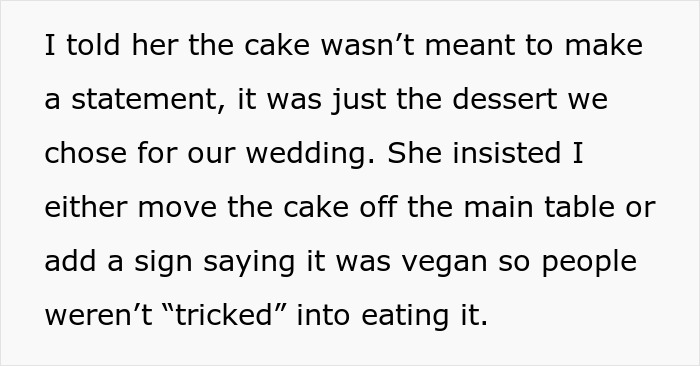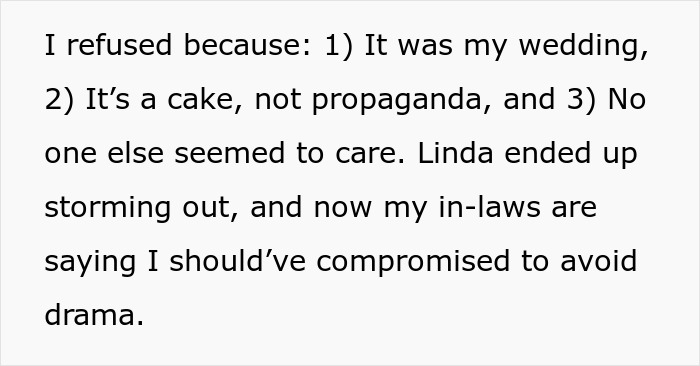Take this redditor’s wedding, for instance. As both of the happy couple were vegan, their wedding was, too, and they made sure to let their guests know that all food, including the cake, would be plant-based. While others didn’t seem to mind it, one guest wasn’t too happy about it, saying that having a vegan cake on the main table was “disrespectful” and that the bride shouldn’t be “pushing her lifestyle” on everyone.
Scroll down to find the full story in the bride’s own words below, where you will also find Bored Panda’s interview with a registered dietitian-nutritionist, Jane Burrell, who was kind enough to answer a few of our questions on the vegan diet.
Related: Woman Called Out For Not Trying SIL’s Famous Casserole: “She Brought Last Year’s Leftovers”
Wedding cakes come in all shapes and sizes, and they can be vegan, too
This bride had to deal with a wedding guest saying that having a vegan cake on display was “disrespectful”

Whether because of ethical, health, or other reasons, people choose to follow all kinds of different diets
Some people don’t like seafood, some others can’t have dairy, then there are people who don’t eat meat and those who refuse to eat any animal products, and, of course, let’s not forget those with food allergies – there are arguably as many dietary restrictions as there are people themselves. And while that doesn’t mean you have to follow the same diets they do, it’s important to be respectful of other people’s choices (and intolerances).
The unhappy guest at the OP’s wedding, Linda, wasn’t too respectful of the couple’s choice to have a vegan wedding cake, though. Not only that, the woman believed that they’re the disrespectful ones, as, in her eyes, displaying a vegan wedding cake is equal to shoving veganism down people’s throats.
While there are vegans—as well as followers of other diets or lifestyles—who do try to convince others that theirs is the only right way, the redditor said that it wasn’t their goal; the vegan cake was simply their choice of dessert, bearing in mind that they are vegan themselves. According to last year’s data, somewhere between 2% and 4% of people in the US were vegans – a number that was reportedly similar in Brazil, China, and Mexico, while in India, for instance, more than a tenth of respondents said they usually followed a vegan diet.
Some people are not fond of veganism, likely because of certain psychological biases
There may be many reasons why Linda took such offense to the couple’s vegan cake, but she’s definitely not the only person who isn’t fond of veganism. According to a piece by BBC, delving deeper into the hidden biases that drive anti-vegan hatred, many people feel animosity towards vegans, often because of deep-seated psychological biases.
“So basically we live in an era today, at least in the Western world, where there’s more and more evidence, more and more arguments, and more and more books about how eating meat is bad,” Hank Rothgerber, a social psychologist at Bellarmine University in Louisville, Kentucky, told BBC. “But still, our behavior hasn’t changed significantly.”
Rothgerber continued to point out that what he’s looking at is how people rationalize the abundance of information that eating meat is bad, and still feel like they’re a good person. And that, according to the expert, takes some serious mental gymnastics.
Known as “cognitive dissonance”, “meat paradox”, or “moral schizophrenia”, the tension that two incompatible views—loving animals and consuming meat, for instance—create has to be released somewhere. And, as BBC points out, it’s not uncommon for people to release it by blaming their negative feelings on something (or someone) else—often without even realizing that they’re doing it—instead of resolving the issues or changing their behavior.
“Eating plants has a smaller carbon footprint than a diet rich in animal products, which may lead to a better sense of well-being,” expert suggests
Whether because of “cognitive dissonance” or their strong personal views, people find all sorts of reasons to criticize an individual’s choice to become vegan. But one seems to be especially common, and that is suggesting that a vegan diet can’t provide all the nutrients a person needs to stay healthy. Seeking to learn whether or not that’s true, Bored Panda discussed the matter with a registered dietitian-nutritionist, Jane Burrell, who noted that as long as a person follows a well-balanced diet and substitutes animal products with the right alternatives to get all the necessary nutrients and vitamins, their health shouldn’t be negatively affected.
“To meet protein needs, plan to eat protein at each meal and snack. Plant-based proteins are considered to be incomplete proteins, that is, they are low in one or more essential amino acids that may result in inability to synthesize necessary proteins to maintain health. This can easily be worked around by having a variety of foods,” Burrell suggested, discussing what things should be kept in mind to lead a healthy vegan lifestyle.
“For example, if you combine rice and vegetables, you have a complementary protein. That is the amino acids that may be too low in rice are contained in higher amounts in the vegetables. Together, these foods provide all the essential amino acids.
“There are many combinations like this including rice and beans, tortillas and beans, bread and peanut butter, tahini and chickpeas and many others. Soy is also a unique plant protein because it is a good source of all essential amino acids. Including tofu, tempeh, soy milk or soy yogurts is a great way to get enough protein and all the essential amino acids,” Burrell added.
The expert then continued to add that in order to meet calcium and vitamin D requirements, one might want to include fortified plant milks and yogurts—soy, rice, almond, oat, pea, or cashew—into their diet. “Just read the nutrition facts label and look for products with 20% of the DV (Daily Value) per serving,” she suggested. “Many other products marketed to vegans are also fortified, for instance, calcium and vitamin D-fortified orange juice.”
“To meet omega-3 at recommendations, including flaxseeds and chia seeds or nuts and nut butters like walnuts and almond butter is a good way to get some of these anti-inflammatory and essential fats.
“Iron and zinc are also nutrients of concern because plant foods which contain them also contain other compounds that reduce their absorption. For example, spinach is very rich in iron and calcium, but the oxalates reduce its absorption in the intestine. To work around this, having a variety of foods helps. For example, including other green leafy vegetables like bok choy, which does not contain high levels of oxalates. Looking for iron-rich foods can also help increase the absorption of non-heme (plant-based) iron, so including brightly colored fruits and vegetables with iron-fortified foods can be helpful.”
Another element that vegans might want to pay extra attention to is vitamin B12, typically found in animal products. “Ingredients like nutritional yeast contain vitamin B12 and also provide a great flavor and texture, or the umami sensation to vegan dishes. Like with calcium and vitamin D, vitamin B12 is often added to vegan foods to help meet the needs.”
The expert suggested that one more thing to consider is that “eating plants has a smaller carbon footprint than a diet rich in animal products, which may lead to a better sense of well-being.” Having cut animal products out of their lives, the OP and her husband decided not to serve any on their big day, either, and they let their guests know about their decision in advance. That was likely why many people believed that Linda was in the wrong for asking the bride to move the vegan cake off the main table.




